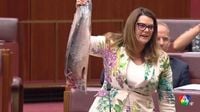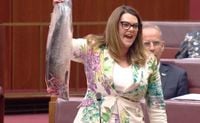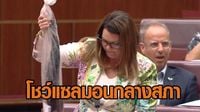In a dramatic display of protest, Australian Senator Sarah Hanson-Young from the Greens party raised a live salmon in a plastic bag during a parliamentary session on March 26, 2025. This unusual act was aimed at opposing a controversial government bill that seeks to protect salmon farming in Macquarie Harbour, a UNESCO World Heritage site located on Tasmania's eastern coast.
The senator's protest was directed at her colleagues, particularly Labor Party Senator Jenny McAllister, who represents the Ministry of the Environment. Hanson-Young questioned the appropriateness of the proposed legislation, arguing that it poses direct environmental risks. "We need to ensure that the 'poo' of aquaculture goes out of the joint," she stated, emphasizing her concerns about the pollution associated with salmon farming.
The bill in question is designed to guarantee the continuation of salmon farming operations in the Macquarie Harbour area, which has been a point of contention among environmentalists and local communities. Critics, including Hanson-Young and various conservation groups, argue that the salmon farming industry contributes to significant pollution, which could adversely affect marine life, including the rare Maugean skate, a species endemic to the region.
Following the uproar caused by her protest, Senate President Sue Lyons requested that Hanson-Young remove what she referred to as her "discussion props" from the chamber. Despite the disruption, the senator remained steadfast in her stance against the bill, highlighting the need for a more sustainable approach to aquaculture.
Hanson-Young's actions sparked a heated debate among lawmakers, with many expressing concern over the environmental implications of the proposed bill. The government, led by the Labor Party, has been a strong proponent of the salmon farming industry, arguing that it is vital for the local economy and job creation. However, the senator's protest brought to light the growing divide between economic interests and environmental preservation.
Environmental groups have long been vocal about their opposition to salmon farming in sensitive ecological areas. They argue that the farming practices lead to nutrient pollution, which can trigger harmful algal blooms and degrade water quality. In Macquarie Harbour, these concerns are amplified by the presence of the Maugean skate, which is already facing threats from habitat loss and pollution.
As the debate continues, Hanson-Young's protest serves as a reminder of the urgent need for a balance between economic development and environmental sustainability. The outcome of the proposed legislation could have lasting effects not only on the local ecosystem but also on the livelihoods of those who depend on it.
In conclusion, the clash between Senator Hanson-Young and the government over salmon farming in Tasmania highlights the complexities of environmental policy in Australia. As lawmakers grapple with the implications of their decisions, the voices of concerned citizens and environmental advocates remain crucial in shaping the future of aquaculture in the region.



